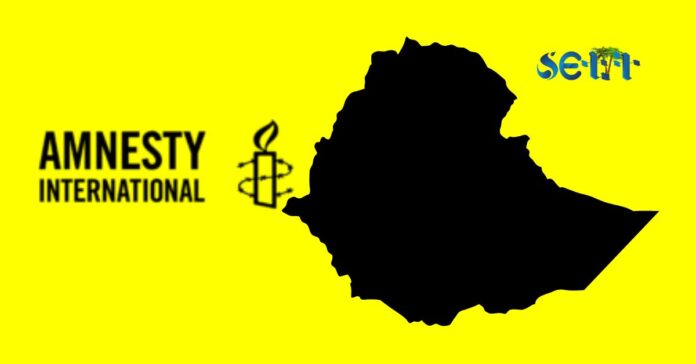Amnesty International has condemned the Ethiopian government’s suspension of three prominent human rights organizations, warning of an alarming crackdown on civic space in the country. The Association for Human Rights in Ethiopia (AHRE), the Center for Advancement of Rights and Democracy (CARD), and Lawyers for Human Rights (LHR) were suspended by the Authority for Civil Society Organizations (ACSO) earlier this month, citing allegations of “lack of political neutrality” and “engaging against the national interest.”
In a statement released Tuesday, November 26, 2024, Tigere Chagutah, Amnesty International’s Regional Director for East and Southern Africa, decried the suspensions as baseless and a violation of fundamental human rights.
“Amnesty International condemns the suspension of AHRE, CARD, and LHR based on vague and unsubstantiated allegations. Such claims have long been used by Ethiopian authorities as tools to suppress civil society organizations. These suspensions must be immediately reversed,” Chagutah said.
The suspensions come amid reports of escalating conflicts and human rights violations in Ethiopia, including arbitrary detentions, forced evictions, and restricted media freedoms. Amnesty International emphasized the critical role of civil society and media in documenting abuses and holding authorities accountable, especially in light of ongoing unrest in the Amhara, Oromia, and Tigray regions.
Ethiopia has faced longstanding criticism for its human rights record, with allegations of suppression of dissent, restrictions on media freedom, and targeted attacks on human rights defenders. The situation worsened significantly during the country’s devastating civil war from 2020 to 2022, which pitted federal forces against the Tigray People’s Liberation Front (TPLF) and later drew in other regional actors.
The conflict, marked by widespread atrocities, left tens of thousands dead and displaced millions. Amnesty International and other organizations documented war crimes and crimes against humanity committed by all parties, including mass killings, sexual violence, and destruction of infrastructure. A fragile peace agreement was signed in late 2022, but the legacy of the conflict continues to fuel tensions and humanitarian crises in the region.
Despite the cessation of large-scale hostilities, Ethiopia has struggled with accountability for wartime abuses, with limited progress on justice and reconciliation efforts. Reports of ongoing violence and rights violations in regions such as Amhara and Oromia highlight the persistent instability.
Chagutah urged the international community to take decisive action:
“Ethiopia’s development partners must abandon their ‘policy of no policy’ stance and prioritize human rights in their engagement with the government. The UN Human Rights Council must urgently establish a mechanism to investigate and document human rights violations in the country.”
The ACSO’s actions began on 14 November 2024, when CARD was suspended for alleged political bias and activities “contrary to national interests.” Similar suspensions were issued to LHR and AHRE on 21 November. The affected organizations have rejected the allegations, describing them as vague and politically motivated, and are seeking legal remedies to resume their operations.
The use of broadly worded restrictions to curtail freedom of association violates Ethiopia’s obligations under regional and international human rights laws, Amnesty International noted.
The suspensions have raised concerns about the Ethiopian government’s increasing suppression of dissent and accountability mechanisms, further isolating civil society at a time of deepening political and humanitarian crises.
Amnesty International’s call for action extends to Ethiopia’s international partners, urging them to adopt a more assertive stance on human rights. Chagutah also called on the UN Human Rights Council to revisit its approach to Ethiopia and establish systems to preserve evidence of violations.
As Ethiopia grapples with internal unrest, the suspension of human rights organizations signals a worrying trend that threatens to erode civic freedoms and stall efforts for justice and accountability in the country.


[…] In November 2024, the Ethiopian government suspended three prominent human rights organizations: the Association for Human Rights in Ethiopia (AHRE), the Center for Advancement of Rights and Democracy (CARD), and Lawyers for Human Rights (LHR). The government cited vague allegations of “lack of political neutrality” and “engaging against the national interest” as reasons for these suspensions. Such actions are seen as part of a broader strategy to silence dissent and restrict the activities of organizations that hold the government accountable [1][2]. […]